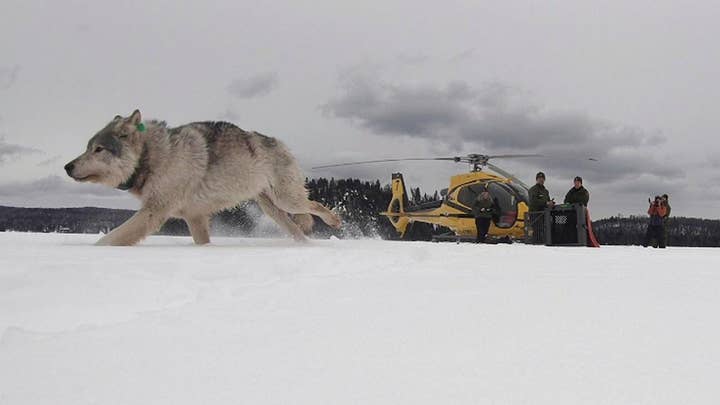Fox News Flash top headlines for August 12
Fox News Flash top headlines for August 12 are here. Check out what's clicking on Foxnews.com
The Trump administration is finalizing major changes to the Endangered Species Act in a bid to reduce the system's regulatory impact, though critics say the shift could accelerate the extinction of struggling creatures.
In the face of such criticism, the administration argued the changes will make regulation more efficient and less burdensome while preserving protections for wildlife.
UTAH BEAR STEALS AND EATS COUGAR'S KILL, VIDEO SHOWS
“The best way to uphold the Endangered Species Act is to do everything we can to ensure it remains effective in achieving its ultimate goal—recovery of our rarest species. The Act’s effectiveness rests on clear, consistent and efficient implementation,” U.S. Secretary of the Interior David Bernhardt said in a statement. “An effectively administered Act ensures more resources can go where they will do the most good: on-the-ground conservation.”
The changes included allowing economic cost to be taken into account as the federal government weighs protecting a struggling species, although Congress has stipulated that economic costs not be a factor in deciding whether to protect an animal.
Gary Frazer, an assistant director at the U.S. Fish and Wildlife Service, told reporters that the government would adhere to that by disclosing the costs to the public, without it being a factor for the officials considering the protections. Other changes include ending blanket protections for species newly listed as threatened.
U.S. Fish and Wildlife and the National Marine Fisheries Service – working under the Interior Department – administer the list of endangered species. The Endangered Species Act is credited with helping save the bald eagle, California condor and scores of other animals and plants from extinction since President Richard Nixon signed it into law in 1973.
Many western state lawmakers praised the move by the Trump administration.
The Endangered Species Act has been a contentious issue in places like Montana, Idaho and Wyoming, with Republican politicians complaining in the past that the act failed to take into account the needs of landowners, hunters and ranchers whose lands are the habit of many of the endangered species.
“This is a win for Montana and the West, and will help restore commonsense, science-based decision-making when it comes to the Endangered Species Act,” Sen. Steve Daines, R-Mont., said in a statement. “These new rules will lead to more transparency, increased recovery of species greater conservation, and will help take the decision-making powers out of the hands of radical activists in the courtroom.”
BABY KANGAROO DIES AFTER ESCAPING TRUCK AT ARKANSAS MILITARY BASE
The changes to the act, however, were slammed by environmental groups who argue that these revisions will gut the protections afforded to endangered species and lead more wildlife toward the brink of extinction.
“This effort to gut protections for endangered and threatened species has the same two features of most Trump administration actions: it’s a gift to industry, and it’s illegal,” Drew Caputo, a vice president of litigation for the conservation advocacy group Earthjustice, said in a statement. “We’ll see the Trump administration in court about it.”
At least 10 attorneys general joined conservation groups in protesting an early draft of the changes, saying they put more wildlife at greater risk of extinction.
CLICK HERE FOR THE FOX NEWS APP
“We’ll be reviewing these changes today, but I can promise you that there is nothing in these new regulations that helps protect threatened and endangered species,” said Kristen Boyles, an Earthjustice attorney.
The Endangered Species Act currently protects more than 1,600 species in the United States and its territories.
A United Nations report warned in May that more than 1 million plants and animals globally face extinction, some within decades, owing to human development, climate change and other threats. The report called the rate of species loss a record.
The Associated Press contributed to this report.







